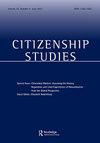大流行时期的公民身份
IF 1.9
3区 社会学
Q3 POLITICAL SCIENCE
引用次数: 1
摘要
全球新冠肺炎疫情已经在全球造成数百万人死亡,数百万人患病,它继续扰乱经济,使社区流离失所,并危及许多本已脆弱的人群的安全。新冠肺炎的传播对公民身份和社区资源造成的压力的范围和规模是在当地和全球活动的流动之后发生的,这些活动在疫情之前就已经确立,公民身份的地位已经出现、持续并继续受到质疑。例如,从2020年1月疫情的早期阶段开始,世界各国政府就广泛利用国家权力关闭边境、限制旅行和限制公众集会,声称合法利用这一权力来减缓疫情的传播并保护其公民。作为回应,一些公民团结起来反对这种限制的暴政,另一些人则主动谴责那些不遵守限制的人,还有一些人自愿帮助陷入困境的医疗服务。尽管政府可能有理由将其权力用作旨在减缓新冠肺炎传播的负责任的公共卫生政策,但权力的行使和这些政策的执行也进一步强化或确立了界限,以使选定的公民受益于所有其他人。关闭边境和隔离社区使移民、土著居民、无证人员和被监禁者进一步受到政府强化限制的负担,无法避免暴露在外。在这方面,新冠疫情突出并加剧了先前存在的种族、性别、社会阶层和国籍不平等,公民身份是通过这些不平等来构建和竞争的。当新冠肺炎成为一场全球健康危机时,种族、阶级、性别和国籍的不平等已经因疫情前民粹主义的兴起而变得紧张。收入不平等、政治不满和新自由主义政策加剧的社会分裂使民粹主义不满情绪进入巴西、匈牙利和美国等国的主流公民生活。民粹主义者对自由民主政府的不信任,加上不满情绪,助长了威权主义,并为政府利用疫情合法加强国家对指定他人的监督创造了机会。在应对新冠肺炎疫情的过程中,一些政府打着公共卫生的幌子,动员并加强了监测活动,以推进民族主义议程。在最极端的情况下,中国的“零新冠肺炎”政策加速了该国向监控状态的过渡。本文章由计算机程序翻译,如有差异,请以英文原文为准。
Citizenship in pandemic times
The global COVID pandemic that has already killed millions of people worldwide and has sickened many millions more continues to disrupt economies, displace communities, and compromise the safety and security of many already vulnerable populations. The scope and scale of strain imposed by the spread of COVID on resources of citizenship and community has followed a flow of local and global activities, well established before the pandemic, through which the status of citizenship has emerged, is sustained, and continues to be contested. For example, from the early stages of the pandemic in January 2020, governments across the world have made extensive use of state authority to close borders, restrict travel, and limit public gatherings, claiming legitimate use of this authority to slow the spread of the pandemic and protect their citizens. In response, some citizens have rallied against the tyranny of such restrictions, others have taken it upon themselves to denounce those who fail to heed restrictions, and still others have volunteered to aid struggling health services. Even though governments may have justified use of their power as responsible public health policy intended to slow the spread of COVID, the exercise of that power and the execution of those policies also either further hardened or established boundaries to benefit select citizens above all others. Closing borders and isolating communities has left migrants, indigenous populations, persons who are undocumented, and those who are incarcerated further burdened by intensified government restriction and left with no recourse to avoid exposure. In this regard, the pandemic has highlighted and exacerbated preexisting inequalities of race, gender, social class, and nationality through which citizenship is constructed and contested. When COVID emerged as a global health crisis, inequalities of race, class, gender, and nationality were already strained by the pre-pandemic rise of populism. Income inequality, political disaffection, and social divisions exacerbated by neoliberal policies allowed populist discontent to enter mainstream civic life in countries such as Brazil, Hungary, and the United States. Populist mistrust of liberal democratic governments, fueled by grievances of disaffection, bolstered authoritarianism and created opportunities for governments to use the pandemic to legitimate enhanced state surveillance of designated others. In their responses to the COVID pandemic, some governments mobilized and enhanced their surveillance activities, under the guise of public health, to further a nationalist agenda. In the most extreme case, China’s ‘zero Covid’ policy accelerated the country’s transition to a surveillance state.
求助全文
通过发布文献求助,成功后即可免费获取论文全文。
去求助
来源期刊

Citizenship Studies
POLITICAL SCIENCE-
CiteScore
3.60
自引率
11.10%
发文量
85
期刊介绍:
Citizenship Studies publishes internationally recognised scholarly work on contemporary issues in citizenship, human rights and democratic processes from an interdisciplinary perspective covering the fields of politics, sociology, history and cultural studies. It seeks to lead an international debate on the academic analysis of citizenship, and also aims to cross the division between internal and academic and external public debate. The journal focuses on debates that move beyond conventional notions of citizenship, and treats citizenship as a strategic concept that is central in the analysis of identity, participation, empowerment, human rights and the public interest.
 求助内容:
求助内容: 应助结果提醒方式:
应助结果提醒方式:


